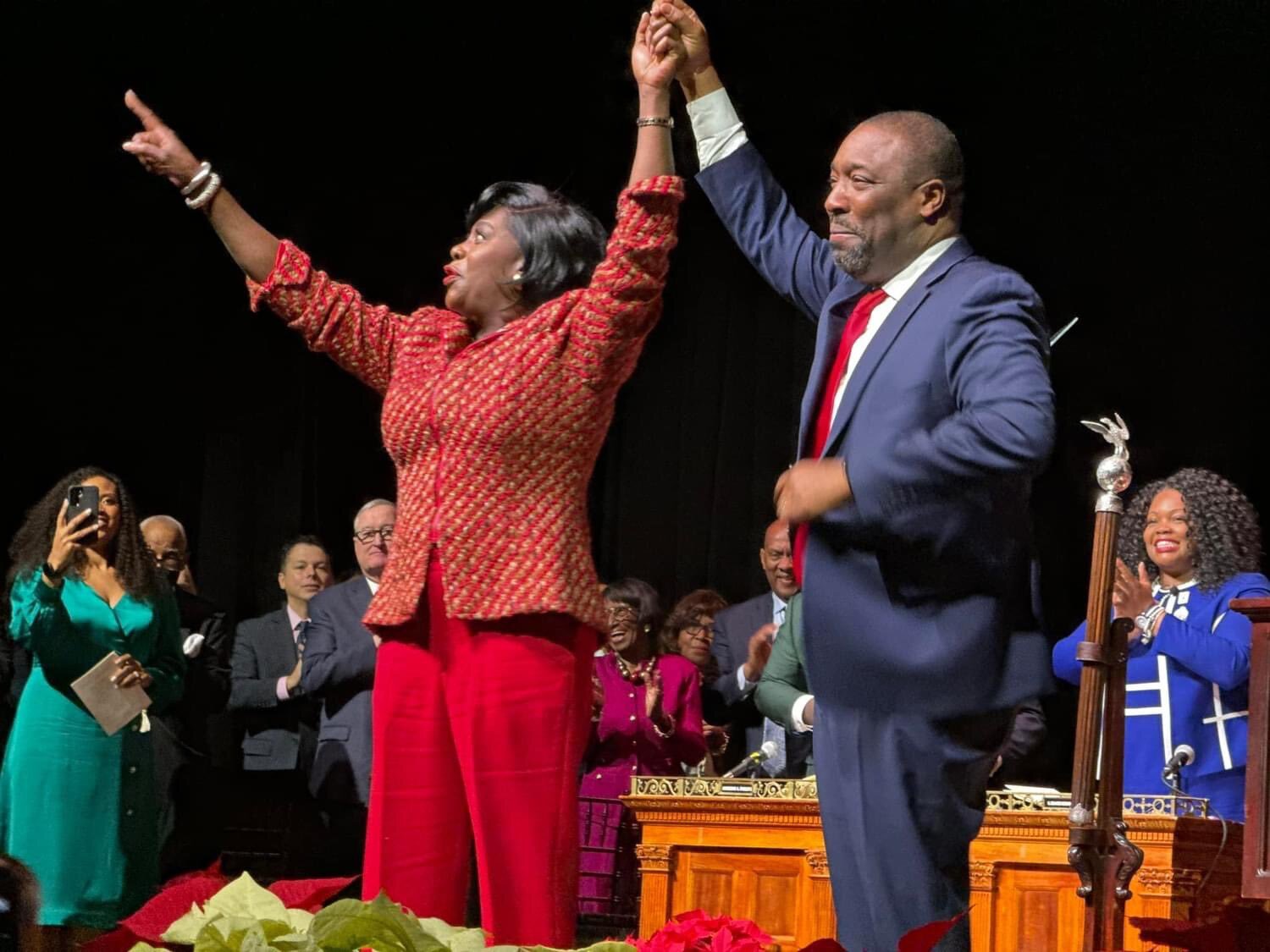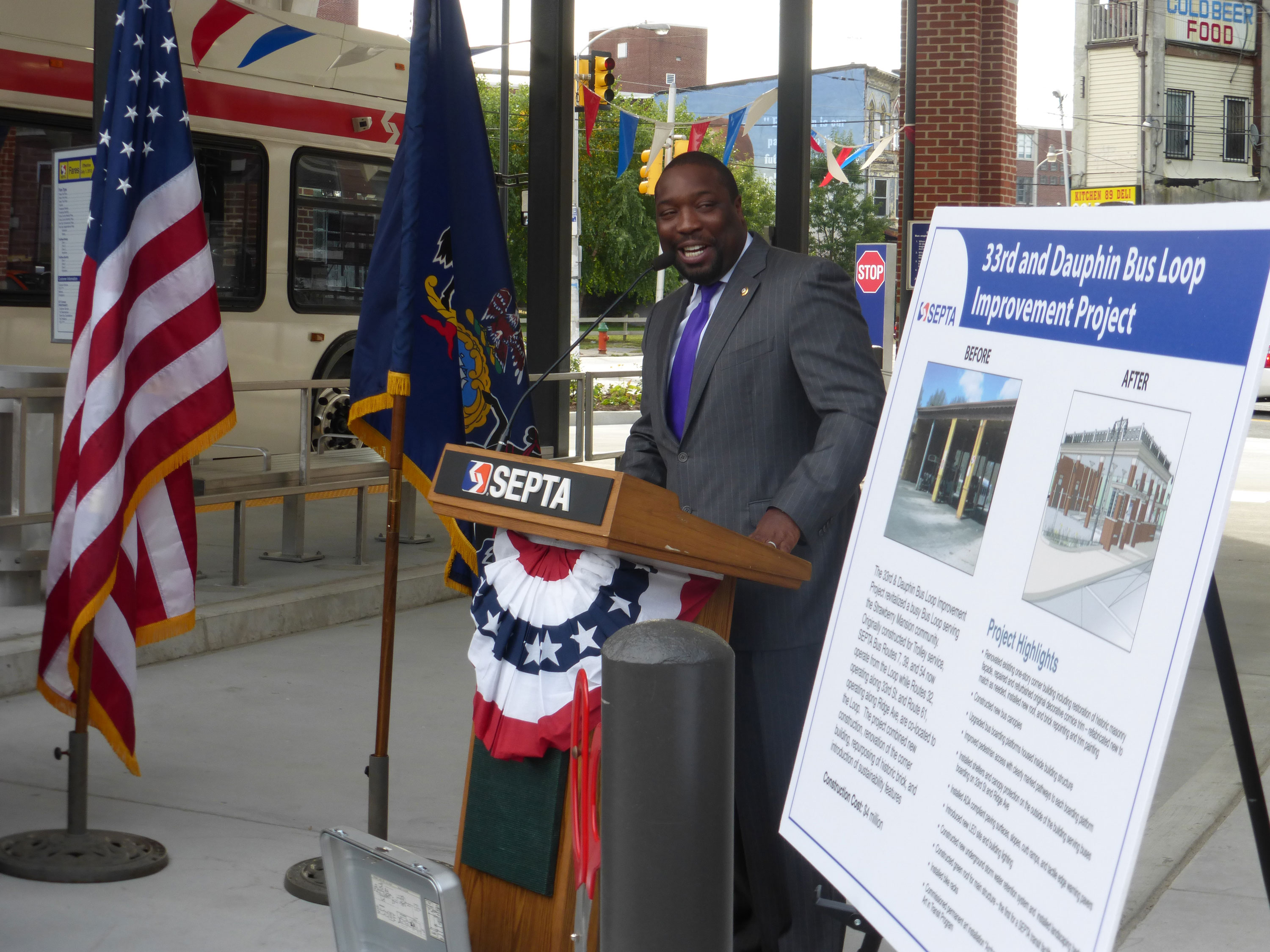Philadelphia
After completing his own turnaround, City Council President Kenyatta Johnson looks to do the same for Philadelphia
The Second District councilmember stepped into the role of council president 14 months after he was acquitted in a federal bribery trial

Kenyatta Johnson was sworn in as president of Philadelphia City Council at the Met Philadelphia. Jared Piper
On Jan. 2, as a visibly emotional Kenyatta Johnson stood on the stage of the Met in Philadelphia, taking the oath to be sworn in as Philadelphia City Council’s new president, he formally began his second act in politics.
Johnson’s ascent to the head of City Council wasn’t just the culmination of decades of political achievement: It was the signal triumph in a years-long journey that put his career – and his freedom – at stake.
In January 2020, Johnson, along with his wife, Dawn Chavous, and executives from the Philadelphia development company Universal, were indicted on federal charges that could have seen him and Chavous facing up to 40 years imprisonment, three years of supervised release and a $500,000 fine.
Instead, after a vigorous defense that ultimately saw him and his wife acquitted in November 2022, Johnson continued on the trajectory that has now led to his becoming one of the two most powerful people in City Hall – a lifetime and two miles from where he grew up.
And in a moment emblematic of his political journey, Johnson took the oath of office on a Bible gifted to him by the Williamses – a Philadelphia political dynasty that took Johnson in as one of their own – and was given a ceremonial gavel by Darrell Clarke, the longtime council president from whom Johnson took the reins.
Born and raised in the Point Breeze neighborhood of South Philadelphia, Johnson, 50, who has a self-proclaimed “mission to serve,” said his family, friends and faith have been major drivers of his search for service.
“I’ve always seen the disparity in the resources my neighborhood had versus other neighborhoods across Philadelphia,” Johnson told City & State in an exclusive interview. “It’s easy, as a kid, to go down blocks where the majority of the block is abandoned. We used to go to different parts of the neighborhood and, to be quite frank, play in the lots of abandoned houses.”
Johnson said the quality of life in his community – he and his friends had to go to other neighborhoods to find safe playgrounds – fueled his passion to improve the lives of others.
“As I grew as a young man and as a leader, I began to look at how I can find ways to have an impact on transforming my neighborhood,” Johnson said.
Johnson’s path forward became clear as he suffered through the losses of several close friends and a cousin, Sultan Chandler, to gun violence during the mid-1990s.
His response to the gun violence that was shattering so many lives around him and the city was to create Peace Not Guns shortly after graduating from Mansfield University, where he served as student body president and got an early opportunity to lobby lawmakers in Harrisburg. Since its founding in the summer of 1998, the nonprofit has taught children conflict resolution, anger management and what Johnson calls “anti-street education.”
Johnson later earned his master’s degree in government from the University of Pennsylvania and worked within the AmeriCorps organization from 1996 to 1998 before volunteering for the man who would become his mentor – state Sen. Hardy Williams – at the turn of the century.
“I was just sick and tired of seeing not only my cousin being hurt, but also African American men day in and day out,” Johnson said of the shootings and his stint with AmeriCorps. “Those were two key times in my life that really shaped and honed my passion and commitment to become a servant and to serve the great City of Philadelphia.”
Johnson said Williams, whom he described as the “godfather of Black independent politics” in Philadelphia, “wrapped his arms around me” and showed his young protégé the importance of inclusivity in politics. Among the lessons he still applies to his work from that time, Johnson said, is that “we can use the work we do … to address those without a voice in those impoverished neighborhoods – and putting their needs above politics.”
Williams, who died in 2010, “played a pivotal role in helping me become who I am today and helping me shape my politics around being an advocate for those who need a voice,” Johnson said.
That unpaid position eventually turned into a key role with Williams’ son, state Sen. Anthony Williams, who recalls being impressed by Johnson’s work ethic from the beginning.
“I was going to support his efforts, not necessarily about politics, but just because he was a young guy in the neighborhood who was trying to do right,” Williams said. “He became a part of our political family, if you will – and, frankly, became a trusted comrade.”
Johnson would run for the state House in 2008, beating his former boss and incumbent Harold James in the race for the 186th Legislative District seat. After two terms in Harrisburg, Johnson came back to city politics, replacing longtime City Councilmember Anna Verna, who opted not to run for reelection in the Second District.

Williams noted that Johnson didn’t immediately jump at the idea of running for public office but that he was always open to serving in any way the community needs.
“Ambition may follow, but he doesn’t show up saying ‘I want to have a title’ as much as ‘I want to serve,’” Williams told City & State.
Once on City Council, Johnson quickly became associated with development issues – and controversy. He fended off challengers in consecutive reelections as his district was dealing with gentrification, and in 2020, he and Chavous were hit with the federal indictment related to Chavous’ consulting work and Universal Companies, a Philadelphia nonprofit developer.
After a more than two-year trial and a mistrial, Johnson, Chavous and their co-defendants were acquitted in November 2022, with a federal jury finding them not guilty of participating in a bribery scheme that alleged Johnson accepted thousands of dollars in exchange for political favors.
Johnson, who has rarely spoken about his legal woes since being acquitted, addressed the trial directly in his inauguration speech after being elected council president by commenting, “What a difference a year makes.”
The jury “knew our integrity, they knew our work ethic, they knew our hearts and they knew our innocence,” Johnson said during the Jan. 2 ceremony. “Today, 14 months later, we are still here, still standing, stronger than ever, and I have the distinct honor of being the new president of the Philadelphia City Council, (in) one of the greatest cities in the world.”
Williams said the amount of support Johnson received from people inside and outside of politics throughout the trial was something he hasn’t seen for a public servant on trial.
“He already established a strong network of faith leaders, community folks and political folks who believed in him,” Williams said. “What was unique about his trial was how many people showed up in court on a regular, daily basis to indicate this support and love for him and his wife. You just don’t see that.”
Johnson now has big shoes to fill as the successor to Clarke, who became renowned for his ability to consolidate and redefine the power of the council president.
In succeeding Clarke, Johnson became the ninth city council president to take the oath of office since the city’s charter was enacted in 1951. He’s also the fourth Black council president, the second from the Second District – and one of the youngest to serve in the role during that time.
Johnson said Clarke has had a lasting impact on the power that City Council has as an independent body, and that he stands “on his shoulders in taking this institution to the next level.”
“We always talked about how City Hall is where the rubber meets the road,” Johnson said. “As council president, I (must) continue to advocate and support the agenda and concerns of my colleagues. I’m council president but it’s not about ‘me’; it’s about ‘we.’”
Now settling into his new office in City Hall, Johnson is issuing committee appointments, filling out staff and preparing for annual budget negotiations – and for his role leading the 17-member council.
Working alongside Mayor Cherelle Parker, Johnson and his colleagues have no shortage of priorities to address, including gun violence, poverty, public education, housing and business development.
Clarke’s utilization of councilmanic prerogative, an unofficial rule that gives district councilmembers final authority over land use decisions in their district, frequently caused controversy during his time leading council. Johnson, who has been accused of favoritism while using councilmanic prerogative on more than one occasion, said he doesn’t have any plans to change the way City Council handles development issues.
The district councilmember “is the person on the ground that works closely, day in and day out, with the constituents that they actually represent. That councilperson is going to be more well-versed than anyone else when it comes to addressing issues around land use and development,” Johnson told City & State. “As long as … their process is transparent, making sure their process provides a level of accountability for everyone that’s involved, I believe that builds trust in terms of how we invest in development and land use here.”
State Rep. Morgan Cephas, a Philadelphia Democrat and chair of the Philadelphia delegation in Harrisburg, told City & State that Johnson is “uniquely qualified” to lead council at a time like this.

“In every role that he has played, he’s used that role as a tool to move the needle,” Cephas said, adding that Philadelphia stands to benefit during this term with new city leadership that has connections to both Harrisburg and a Democrat-led state House. “I’m optimistic that with the leadership that’s in Philly and our ability to work across the aisle in Harrisburg ... it’s going to go really well for Philadelphia.”
There’s still a great deal of uncertainty when it comes to how Johnson will work with Parker and his fellow councilmembers, but also how disagreements – which were often kept behind closed doors during Clarke’s tenure – will play out in real time.
Neil Oxman, a Democratic political strategist, said only time will tell if Johnson and Parker will have the “do it together” mentality that previous council presidents and mayors have embraced.
“Everybody is on the same page about the same stuff,” Oxman said, but if and when the two longtime politicians do disagree, there’s little expectation of a repeat of the rocky relationship between former Mayor Michael Nutter and the Clarke-led council during his tenure.
Clarke, who spent more than four decades in public service and 12 years leading City Council, opted to positively impact the city as a councilmember rather than seeking the mayoralty or another office.
With Parker widely assumed to pursue a second term, Johnson appears primed to do the same.
Declining to speak directly on his future plans, Johnson said his primary focus is solely on this current term – but that he looks forward to “continuing this work for years to come.”